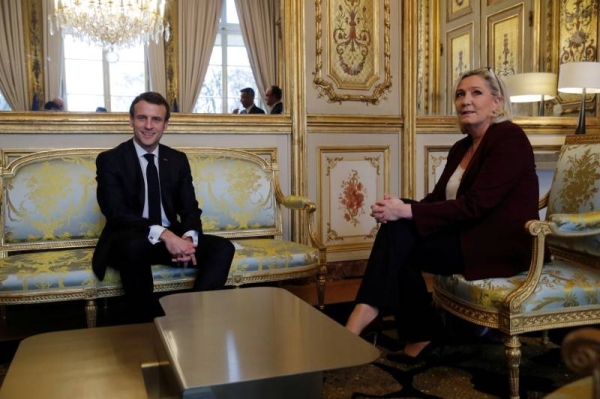The first round of France's presidential election began on Sunday amid unprecedented international challenges facing the 12 candidates, especially those related to the Ukrainian crisis and its repercussions on the European arena.
France and the European countries get ready to receive the migrants fleeing Ukraine due to the military operations there.
Internally, French candidates are trying to provide answers to the voters on different daily matters like improving living conditions, housing and health services as well as others that concern daily lives of people.
According to France's Constitution, which was written in the era of former president Charles de Gaulle in 1958 and re-written in 1962, the French presidential election is held every five years by direct voting and the elected president can be re-elected for one time only.
The candidates are topped with incumbent French President Emmanuel Macron, centrist, far-right candidate of the National Rally party Marine Le Pen, Far-left La France Insoumise Jean-Luc Melenchon, right-wing Les Republicains Valerie Pecresse and Far-right Eric Zemmour.
According to opinion polls, the first five candidates took a leading position over the rest of the candidates namely Workers' Struggle (LO) far left party Nathalie Arthaud, Right-wing Nicolas Dupont-Aignan, Socialist Anne Hidalgo and others.
Macron, 44, was elected in 2017, putting an end to the hegemony of the two poles of the French presidential election between the right-wing and the socialist parties after establishing his party.
Macron announced that he was open to the European Continent and planned to promote cooperation and coordination with heads of the European countries mainly Germany.
During his first term in office, Macron faced many challenges mainly the "yellow vests" demonstration that swept the largest French cities in protest against the rise in fuel prices and the deteriorating standard of living. The protests were followed by calls for comprehensive political and economic reforms.
Early 2020, the world faced the coronavirus and its economic repercussions, therefore several decisions were taken that increased burdens of people mainly on economic and social aspects.
Le Pen, who founded the National Rally party similar to her father Jean-Marie Le Pen's far-right party National Front, has been facing difficulties in her campaign in terms of consolidating her electoral bases since Zemmour's announcement his participation in the presidential race.
Zemmour lured the far-right fans with statements and speeches against immigrants and the French People of Arab and African origins.
Le Pen lost several of her supporters mainly her niece Marion Marshall, who was one of the most prominent future leaders of the party before 2017. Marshall has recently joined Zemmour's camp.
Of the most prominent aspirations of Le Pen is to conduct a popular referendum to limit immigration to France, abolish the right to land that guarantees French citizenship to any child of foreign parents who is born in France, prevent immigrants from social aid offered by the state as well as consolidate French sovereignty and law on the European legislation and acts, and cancel taxes imposed on those who are under 30 years old.
Meanwhile, Melenchon, 70, has a lot of experience in both French and European parliaments, and the Senate, in addition to his post as minister.
He is running for the presidential election for the third time. He believes in changing economic and political policy of the State, and calls for reforms of living conditions for the middle and poor classes in France.
Of his most important electoral programs is the need to form a constitutional council to discuss the radical changes to the system of rule and the transition to the Sixth Republic.
He came fourth in the 2017 presidential election with 19.5 percent. His program also focuses on problems of private housing and he vowed to build 200,000 housing units annually. He is planning to raise minimum of salaries up to 1400 euros and reduce the retirement to 60 years old.
He believes in the withdrawal from the NATO and making France neutral in its international relations.
Les Republicans' candidate Pecresse, 54, is the first woman to succeed in representing the party since Jacques Chirac and Nicolas Sarkozy. She gained the voters' confidence and tries to attract Macron's electoral bases. She served as higher education minister in the era of Sarkozy between 2007-2011 and economy minister in 2011-2012.
Of the most prominent of Pecresse's electoral program promises are reducing public spending, cancelling 200,000 government jobs, increasing jobs in security, health and education and raising all salaries by 3 percent through canceling some direct deductions.
Unlike the leftist candidates, Pecresse stressed the importance of raising the retirement age from 62 to 65 years old and shared Le Pen's view on the abolition of the right of land to citizenship.
More about:
















































